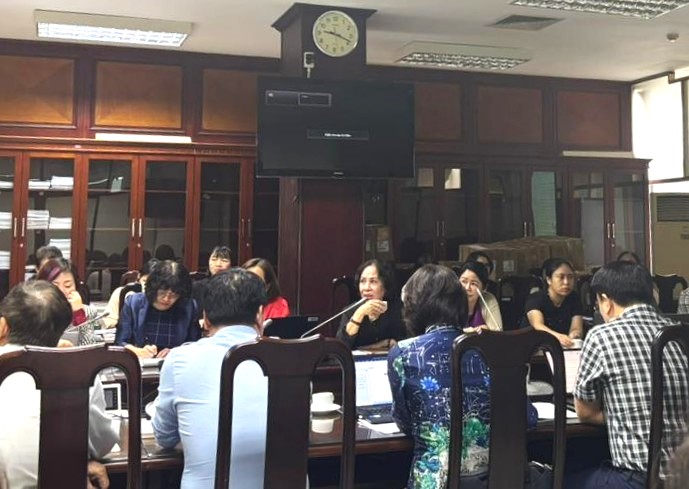On 30 October 2025, EuroCham Vietnam participated in an appraisal meeting on the Draft Circular guiding the classification of medical equipment based on technical and quality standards. The meeting was organised by the Department of Medical Infrastructure and Equipment under the Ministry of Health (MOH).
The meeting gathered a wide range of representatives, including:
- Representatives from the Department of Public Procurement and the Vietnam Social Security, Ministry of Finance
- Representatives from the Department of Planning and Finance (MOH), Department of Health Insurance (MOH), the Office of the Ministry (MOH), and the National Centre for Centralized Drug Procurement (MOH)
- Representatives from hospitals and local Departments of Health
- Representatives from VCCI, the Vietnam Medical Equipment Association, AmCham, USABC, and medical device manufacturers and distributors
Representing EuroCham’s Medical Devices and Diagnostics Sector Committee (MDDSC), Ms. Hue Chu shared key business perspectives and recommendations to enhance the practicality and international alignment of the Draft Circular.

Key Business Recommendations
From the industry’s standpoint, Ms. Hue emphasised that some provisions in the current draft could lead to unnecessary administrative burdens for importers and manufacturers—particularly regarding the recognition of foreign conformity assessments and documentation proving technical compliance.
- Regarding Article 2, Point c – “Results of conformity assessment by international or foreign conformity assessment organisations recognised in accordance with Vietnamese law on standards and technical regulations”, she noted that the phrase “recognised in accordance with Vietnamese law” presents practical difficulties.
- Article 57 of the Law on Standards and Technical Regulations recognised that organisations must belong to ILAC, APAC, or IAF. In practice, verifying that a conformity assessment organisation meets this requirement is complex, as such information is not contained in a single certificate but must be checked through multiple steps and official websites of these international forums. Moreover, the status of these organisations may change over time due to mergers or other restructuring, creating inconsistencies in verification. Therefore, she recommended removing this restrictive condition and accepting conformity assessment results from all recognised international or foreign organizations to ensure fairness between domestic and international stakeholders.
- Clause 2(b), Article 57 of the Law on Standards and Technical Regulations, which allows competent ministries to unilaterally recognise conformity assessment results from foreign organisations when deemed appropriate for management purposes.
- Regarding Article 2, Point d – “Documents from the medical device owner proving that the device meets technical standards”, Ms. Hue proposed revising this to: “Documents from the owner or the manufacturer of the medical device proving that the device meets technical standards”. She explained that in many cases, the owner and the manufacturer are separate entities, and the manufacturer is typically the one that issues technical documentation. This revision would better reflect international practice and reduce compliance confusion for enterprises.
- Regarding implementation timeline: Ms. Hue recommended that adequate preparation and training time should be provided for hospitals and relevant institutions prior to the Circular’s enforcement to ensure smooth and effective implementation.
Afternoon Session: Centralised Procurement Draft Discussion
In the afternoon, the meeting turned to the Draft Circular on the national list for centralised procurement of medical equipment and testing supplies, organised by the Legal Department under the MOH.
Ministry representatives outlined the draft’s objectives to:
- Enhance transparency, efficiency, and consistency in national procurement;
- Strengthen centralised management and cost efficiency;
- Ensure quality, technical compliance, and effective allocation of resources.
Participants, including representatives from public hospitals and enterprises, contributed feedback on implementation mechanisms and procurement flexibility at the hospital level.
EuroCham’s Continued Commitment
EuroCham and its Medical Devices and Diagnostics Sector Committee (MDDSC) remain committed to working alongside the Vietnamese Government to refine and harmonise regulations governing medical devices. We will continue to support efforts toward regulatory transparency, administrative simplification, and alignment with international standards, helping Vietnam advance a safe, innovative, and sustainable healthcare system.







